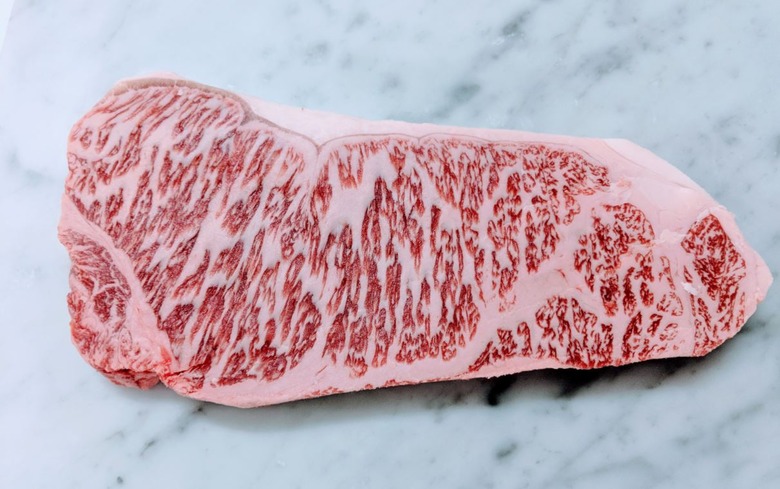How To Cook Kobe Beef, The World's Most Expensive Steak
Nowadays, it seems as if every bar is offering some sort of "Kobe beef slider" or something similar, but in reality, there's no way any of those contain even a trace of real Kobe. Why? Because Kobe beef is up there with the most expensive beef in the world, only available at a handful of high-end steakhouses in America. But if you can afford it, a handful of companies (including Holy Grail Steak Co. and New York Prime Beef) are selling real-deal Kobe beef online, and we had the opportunity to cook up a Kobe steak for ourselves.
How to Cook Steak Perfectly on the Stove Every Time
So what is Kobe beef, exactly? Kobe comes from the Japanese Black breed of cattle (one of the four breeds that can officially be called wagyu) that are raised in Japan's Hyogo Prefecture according to very strict rules. These cows are pampered to no end (stories are told of massages, classical music and beer feedings), and the end result is beef that's so intensely marbled that it's a full two notches above Prime, which is the most marbled grade on the USDA's scale. And because of the cows' diet, the marbling is full of healthy monounsaturated fatty acids, so it's not actually as unhealthy as it appears. The meat itself is incredibly tender and flavorful, and it's also extremely expensive — the 15-ounce Kobe strip we were sent, from Holy Grail, retails on the website for $299.
The steak arrived frozen, and after letting it defrost for a couple days in the fridge we were able to really admire it: There really is nothing else like a Kobe steak. Because it's so rich, 15 ounces is way too much for one or two people to enjoy; an occasion like this called for a party.
Even though most steaks can benefit from an hour or two at room temperature before being cooked, Kobe steaks should go right from the refrigerator to a ripping-hot cast-iron pan in order to give the outside a nice sear without overcooking the middle (it's a thin steak, less than an inch thick). After giving each side a thorough salting, into the pan it went, smoking and sputtering. I flipped the steak every minute until it achieved a nice golden crust on both sides, using my trusty probe thermometer to make sure that the internal temperature didn't get much past 125 degrees, the perfect medium rare.
After letting the steak rest on a wire rack for five minutes, I got out my sharpest knife and carved it into about 20 paper-thin slices, on the bias.
None of the guests had ever sampled Wagyu beef before, and their responses were priceless. Kobe beef, when cooked properly and sliced super-thin, literally melts on your tongue, and it has a super-rich and beefy flavor, and everyone's jaws dropped after taking their first bite. This was followed by quiet reverence as we all polished off the platter faster than we probably should have, followed by an impromptu round of applause.
If you can afford the splurge, skipping the restaurant and cooking up the most luxurious steak on the planet for your friends in the comfort of your own home is a whole lot of fun. Kobe beef isn't just a steak; having the opportunity to sample it is a truly luxurious experience, and it's certainly up there with the absolute best things you can bring to a party.
Dan Myers is The Daily Meal's Deputy Editor. You can follow his culinary adventures on Instagram @sirmyers. The Kobe beef in this article was provided by Holy Grail Steak Co. at no cost to the author.
